Best gravel bikes 2025: extensively ridden and rated
Our top-rated and best gravel bike reviews to suit all styles, terrain and budgets, from bikepacking to gravel racing
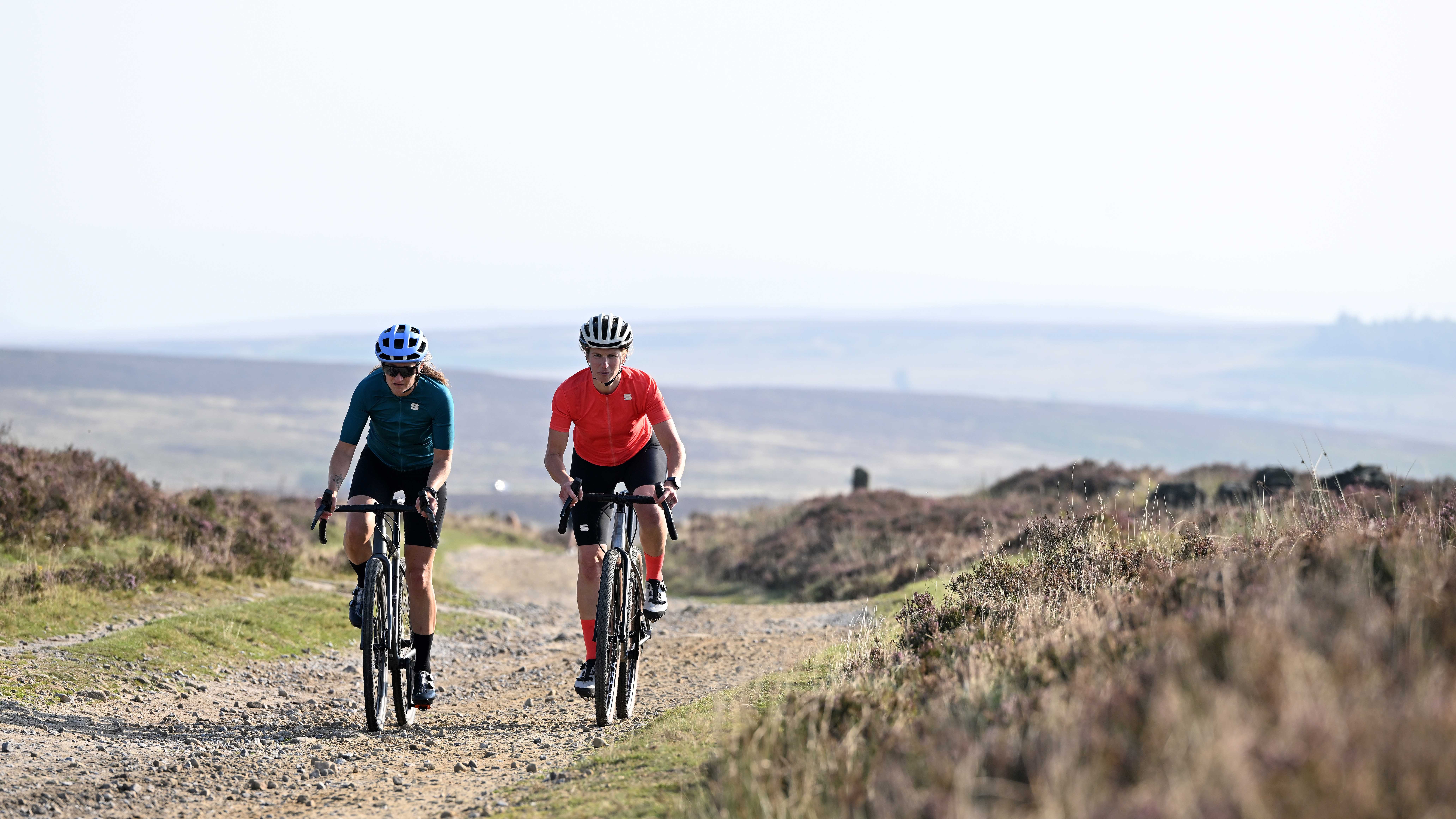
The best gravel bikes are unlike any other category; the term encompasses a vast array of bikes that can be ridden in wildly different ways. We have tested everything from fast, aerodynamically optimised gravel bikes to rugged steel frame bikes with knobbly mountain bike tyres and suspension. That is the beauty of the best gravel bikes: you can tailor your bike to suit your preference for on- and off-road riding. This versatility lends them to much more than just racing or weekend adventures; they can be fantastic for commuting, bikepacking and touring, cyclocross racing or even just as a winter road bike.
So, what are the best gravel bikes? Whether you want to ride the King Alfred Way or race the red dirt roads of Kansas, we can recommend a bike for you. Our expert reviewers have extensively tested every gravel bike below. Through all this testing, the team unanimously awarded the Giant Revolt X our best overall gravel bike. We have tested several versions of the Revolt, and every time we swing a leg over one, its handling, comfort and value stand out from the crowd.
If you are entering the world of cycling or gravel riding and the bikes on this page seem a little pricey, why not check out our guide to the best budget gravel bikes?
The Quick List
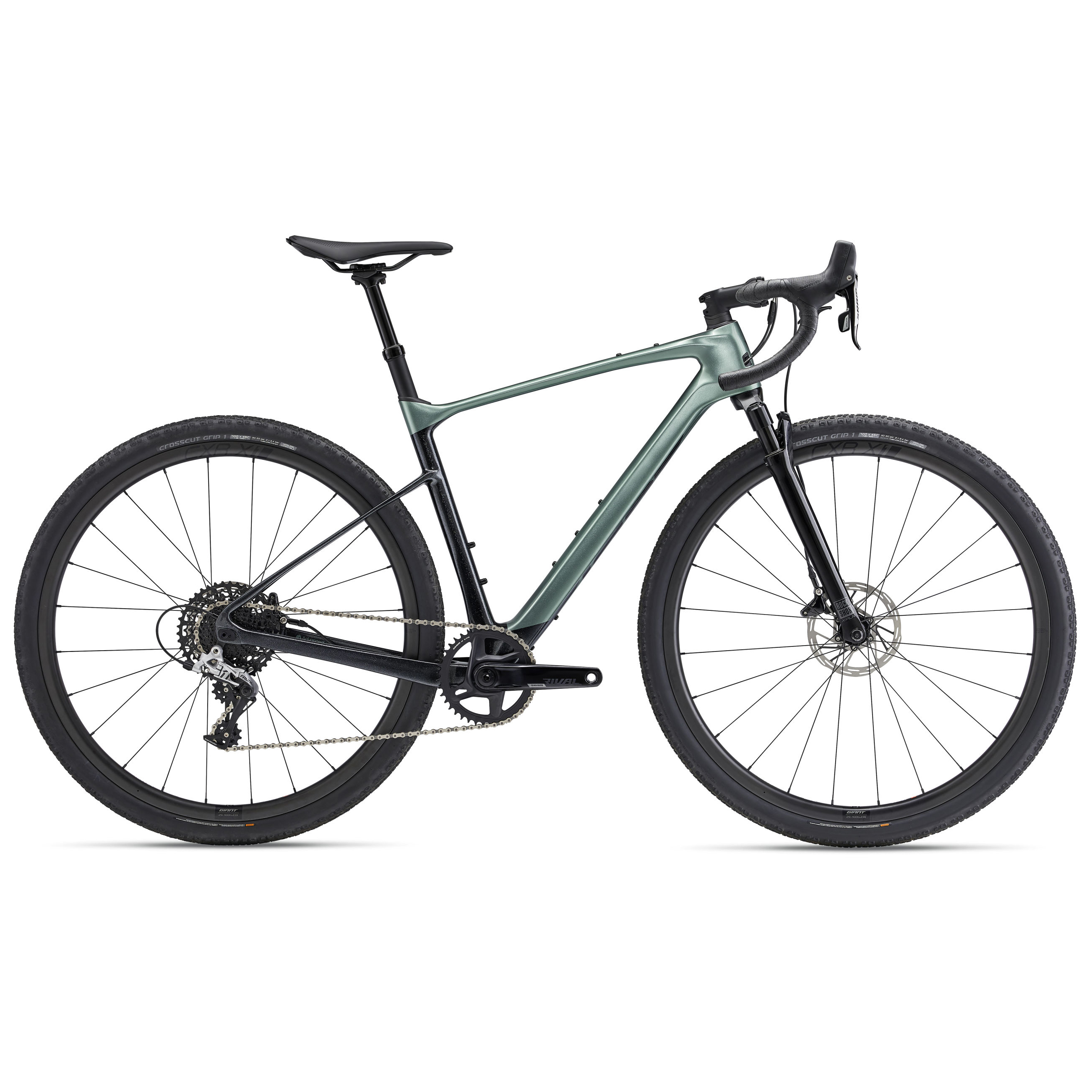
Awarded 5 stars and our Gravel bike of the year two years in a row, the Revolt platform is a firm favourite among the Cycling Weekly tech team. Its comfort, compliance, handling and value set it apart from the rest.
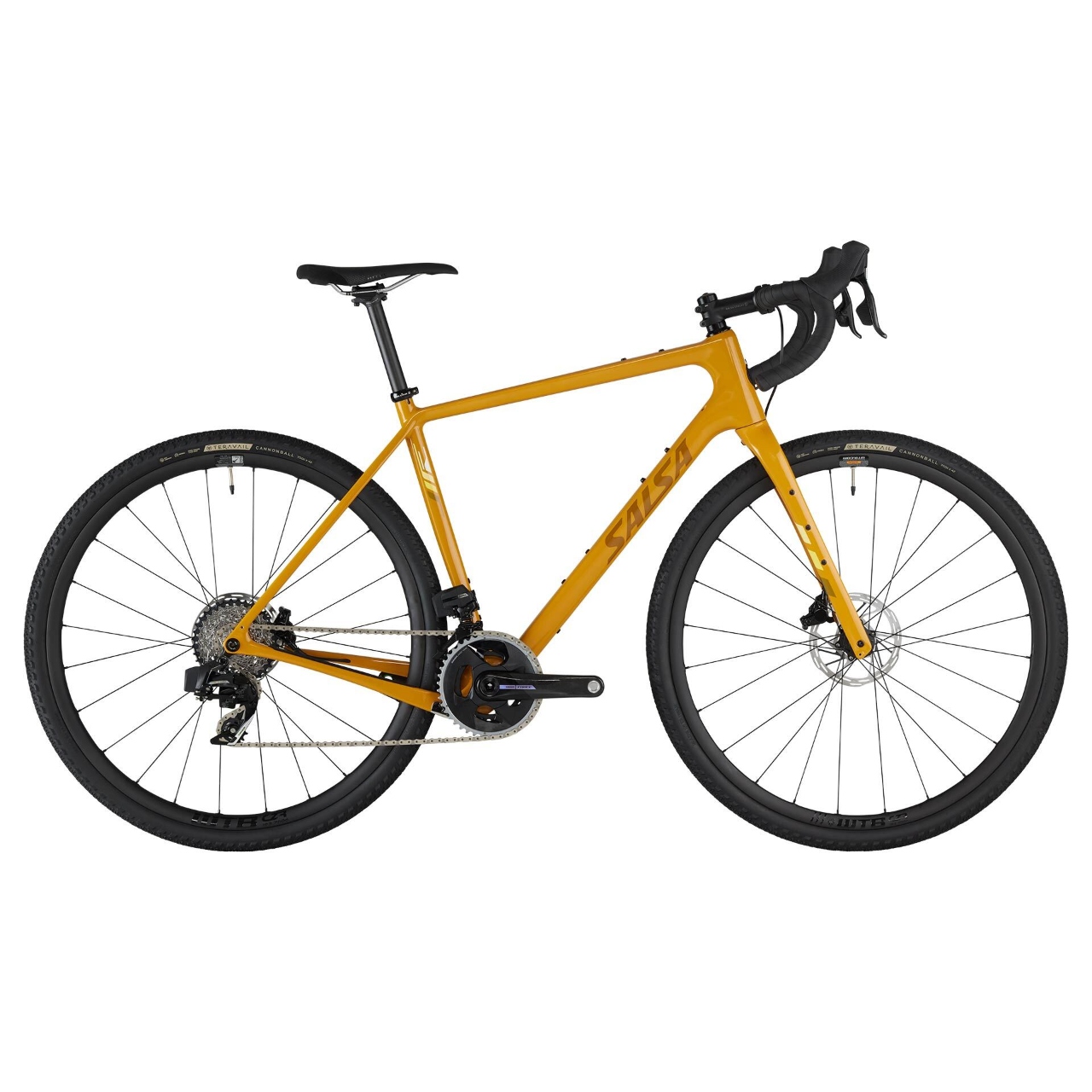
The 'OG' of gravel bikes, the Salsa Warbird C remains committed to simplicity and devoid of gimmicks. This results in levels of comfort and efficiency still unrivalled in today's market as long as things don't get too rough.
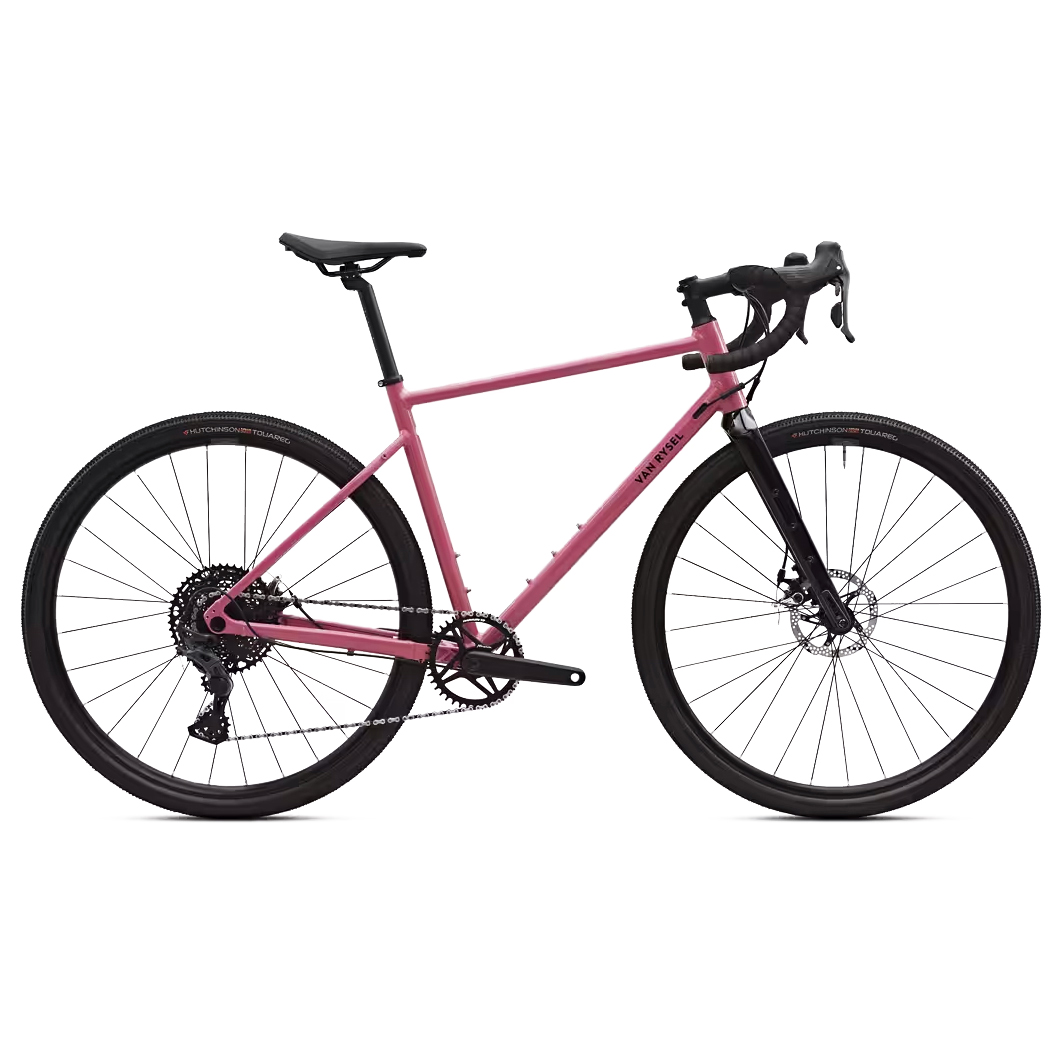
There is little to fault with GRVL AF from Decathlon's in-house brand Van Rysel. Its incredible value is supported by a comfortable and engaging ride that suits a wide range of riders, from complete beginners to those more seasoned.
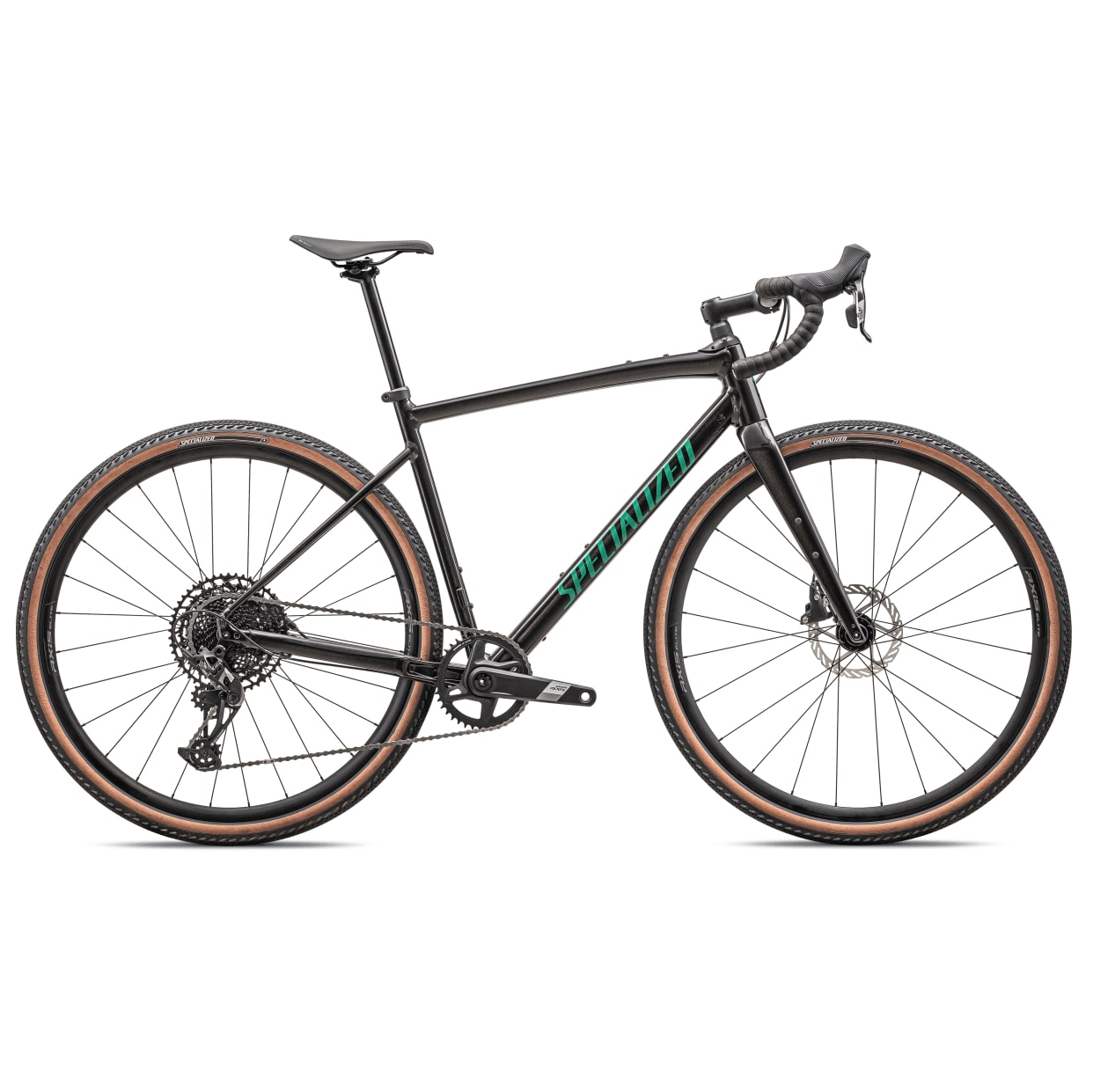
The relaxed geometry and position of the Specialized Diverge Comp E5 will appeal to long-distance gravel riders. It's a value platform that suits not only those new to gravel but also seasoned vets looking to steer further off-road.
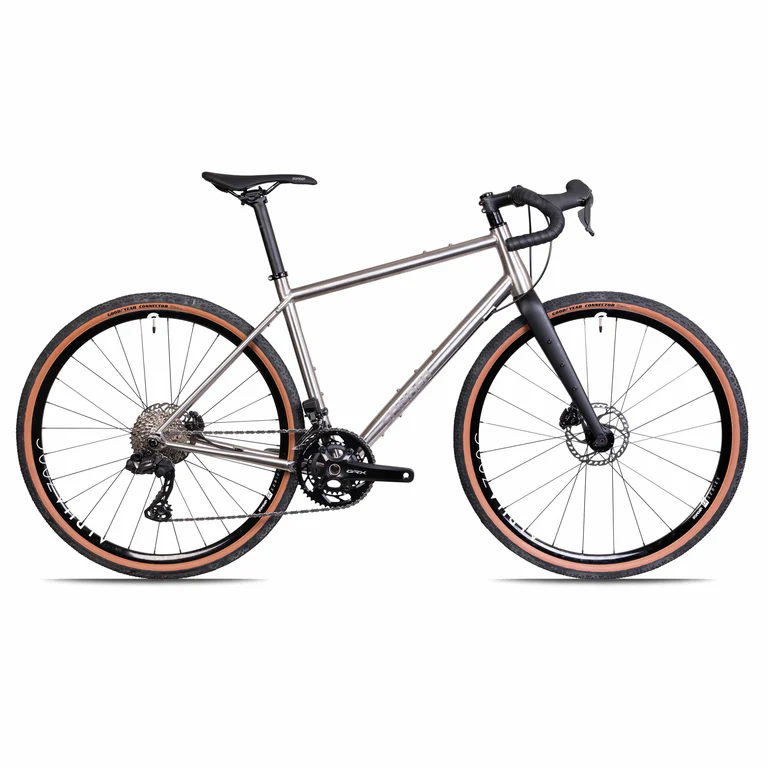
The Camino Ti is unapologetically a bike crafted for technical gravel, which demonstrated its capability and versatility throughout my experience on the Camino. It is also unbelievably competitively priced and not just for a Ti bike.
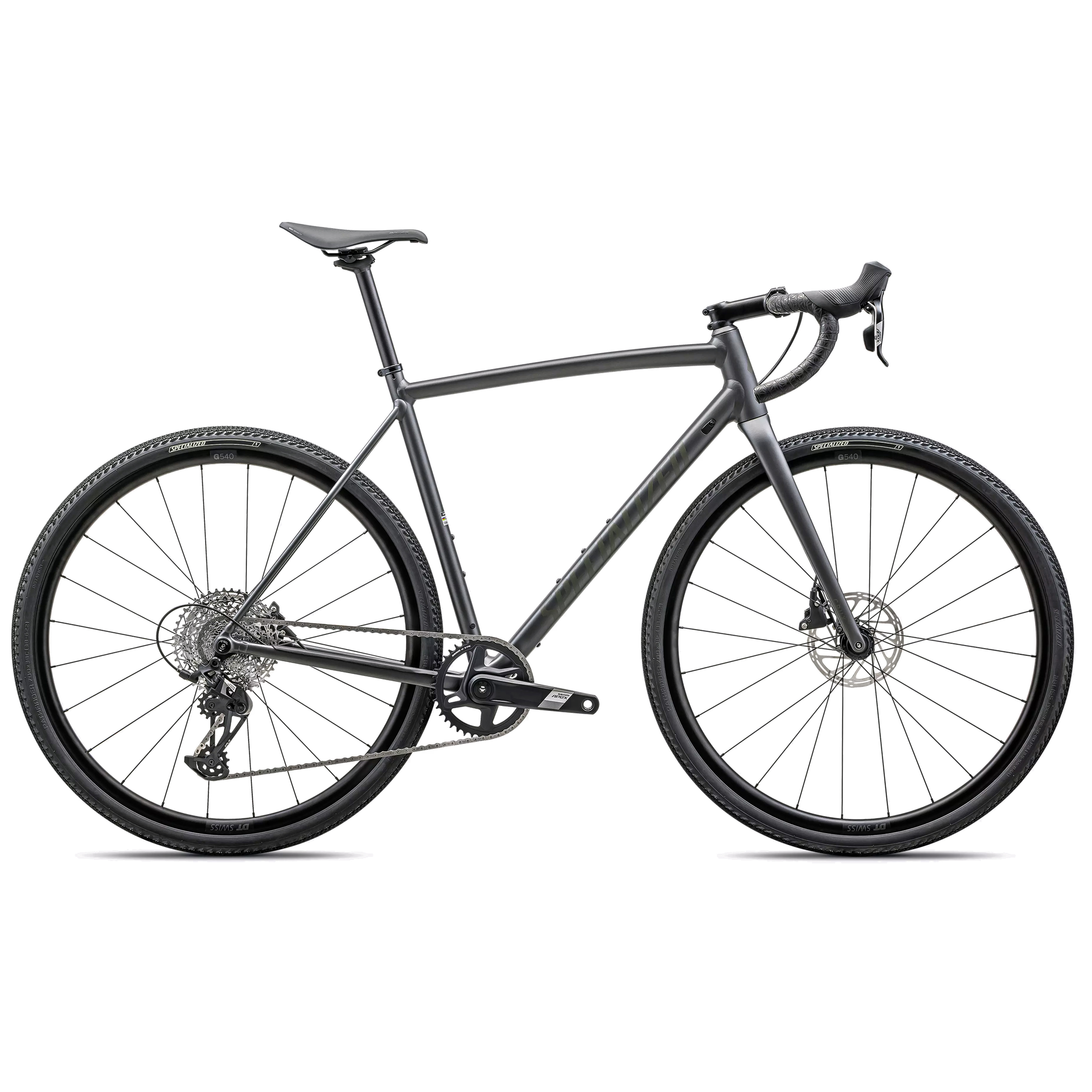
The Crux DSW stays true to the design and purpose of its far more expensive carbon sibling. Its sprightliness makes it a joy to ride, resulting in a feeling of wanting to ride faster and faster, which, for me, was regularly above my fitness level.
Load the next 3 models
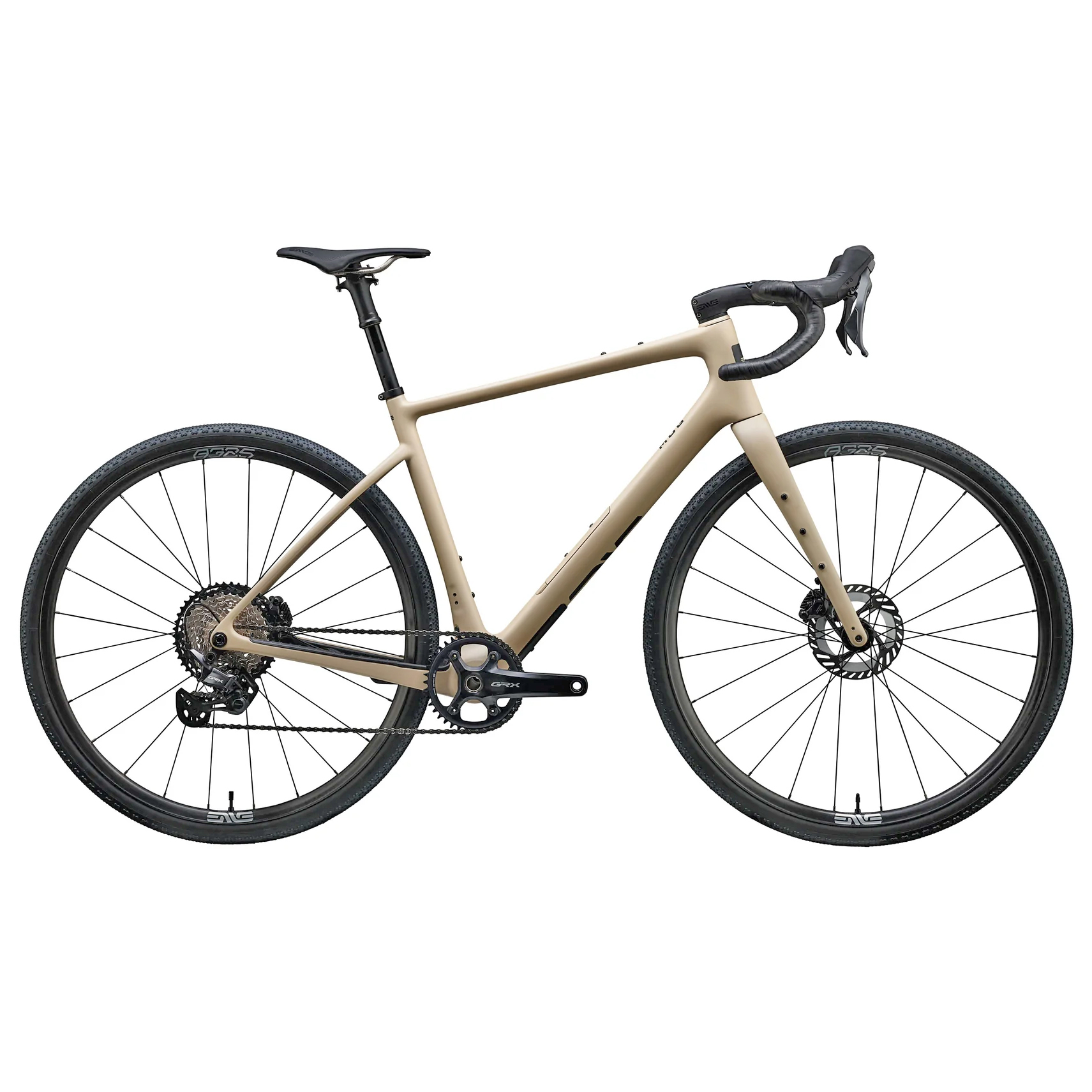
By pursuing a balanced ride feel, upholding stiffness, and without sacrificing comfort, the ENVE Mog is not outsprinting anyone. It is, however, easily keeping up but, at the same time, not beating you up.
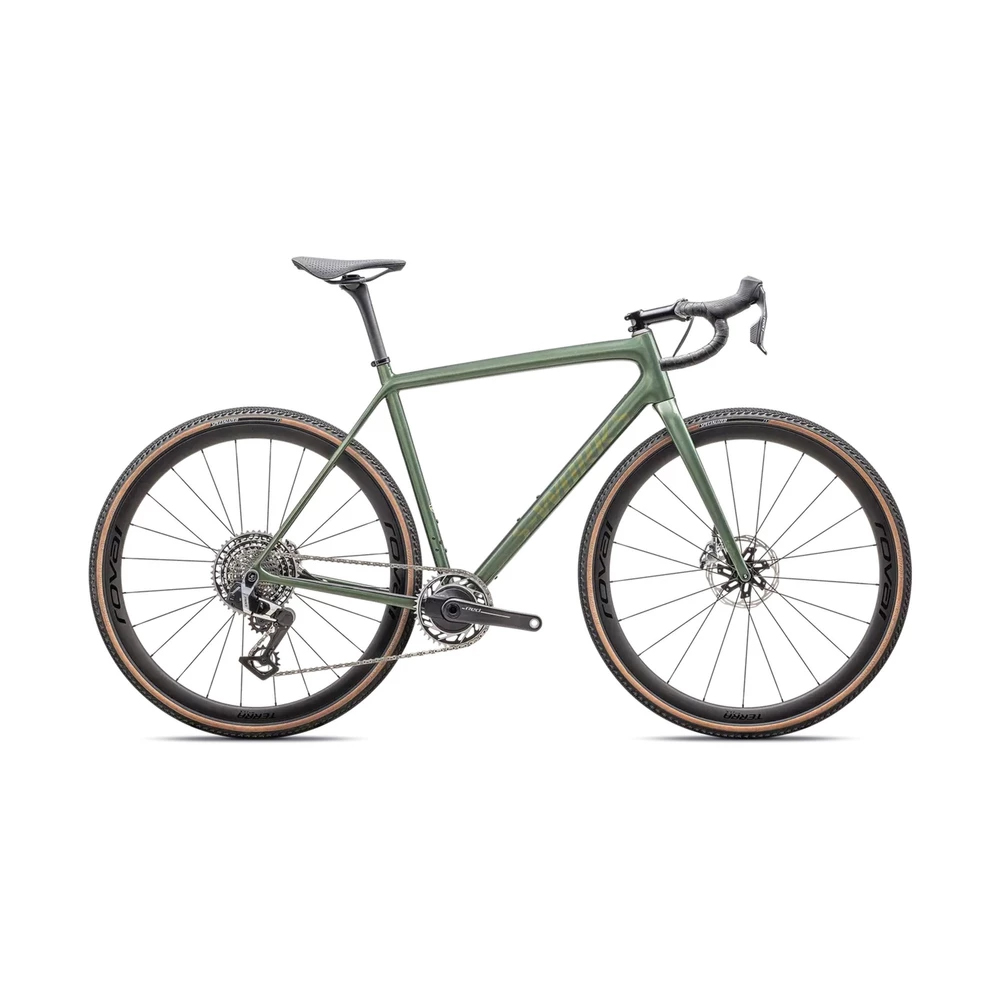
It's not cheap, we know that, but stick with us. It is a seriously good bike and arguably justifies its high asking price. The Crux's agility, stability, versatility and lightness are out of this world.
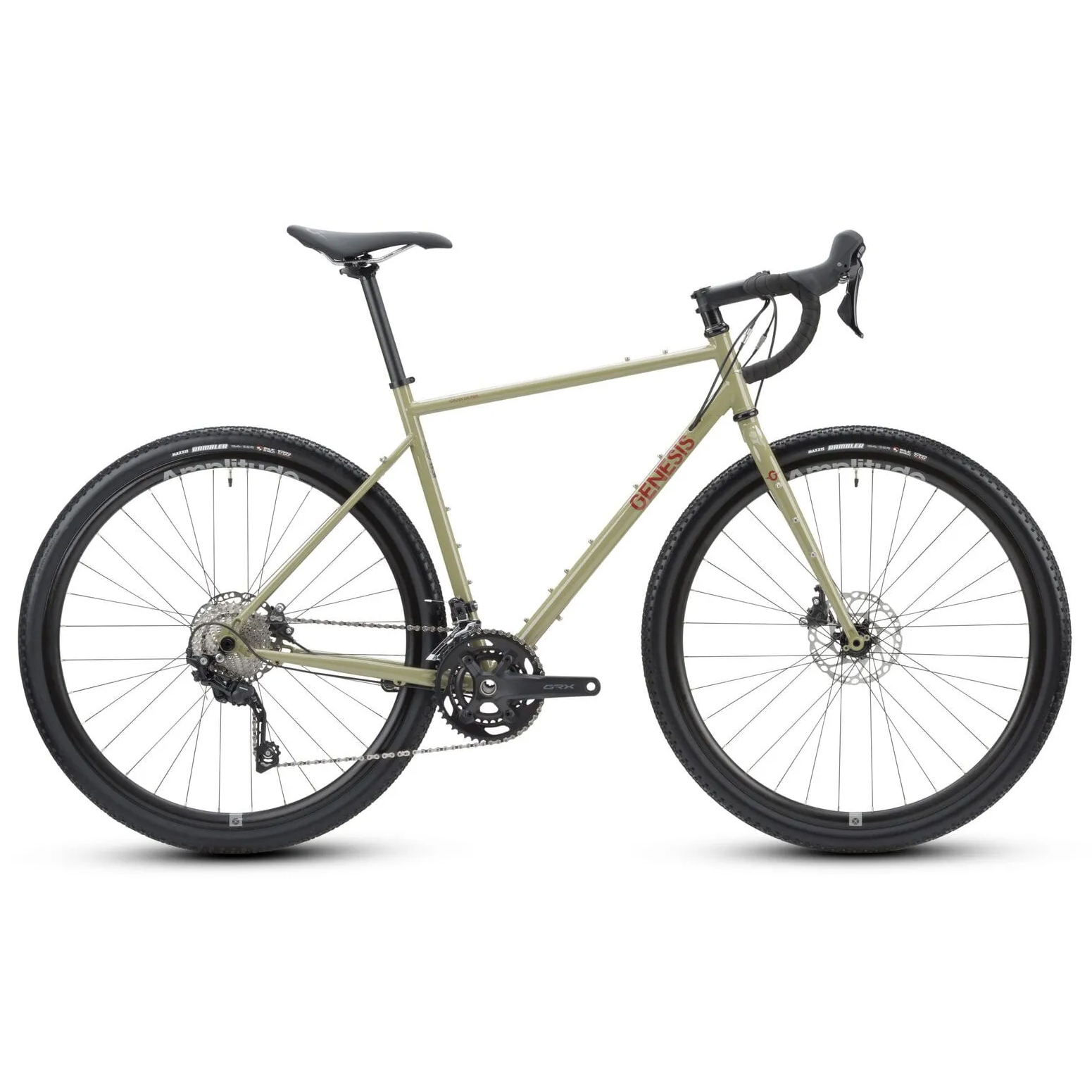
The ethos of the now iconic Genesis Croix de Fer hasn’t changed much in the last 16 years, but this latest version really takes a step forward. Instantly comfortable and excels on those long, all-day rides.
The best gravel bike; rated and ridden by Cycling Weekly
Best overall
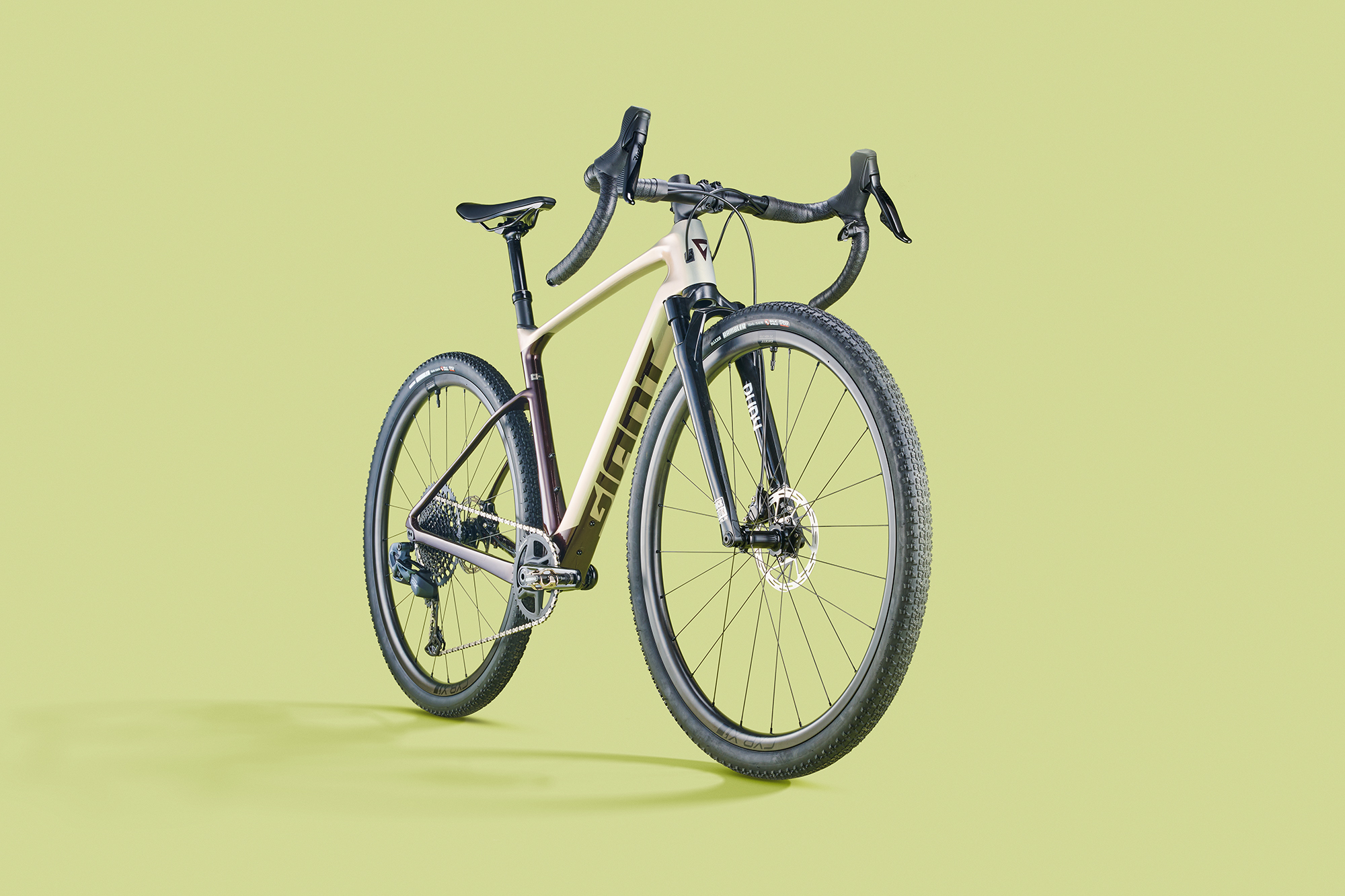
The Giant Revolt has been awarded 5 stars on multiple occasions by the CW team
Specifications
Reasons to buy
Reasons to avoid
The Giant Revolt is a bike we unanimously like here at Cycling Weekly. Not only has it previously won our converted gravel bike of the year award, but it is also a double five-star rated bike. Both the more off-road-oriented Revolt X featured here and the more standard rigid version Revolt Advanced Pro 0, topped their class.
So, what is it we love so much about the Revolt?
Well, let us start with its basic spec. Giant is ahead of the curve here, at least of the big manufacturers, offering a whopping 53mm tyre clearance. Giant also offers the Revolt in both rigid and suspended formats, still a rarity in the gravel market.
What Giant has done with the frame is what really got both James and Dan waxing lyrical about the Revolt for two consecutive years! The built-in compliance and comfort are simply amazing. After an incredible 500 miles across a Welsh mountain range, travelling along King Alfred's Way, and many hours of adventure on the South Downs Way, James even mentioned, "It's the best gravel bike I have ever ridden!" It was truly put through the wringer by James to reach that conclusion!
Read our full Giant Revolt X Advanced Pro gravel bike review
Best for US gravel
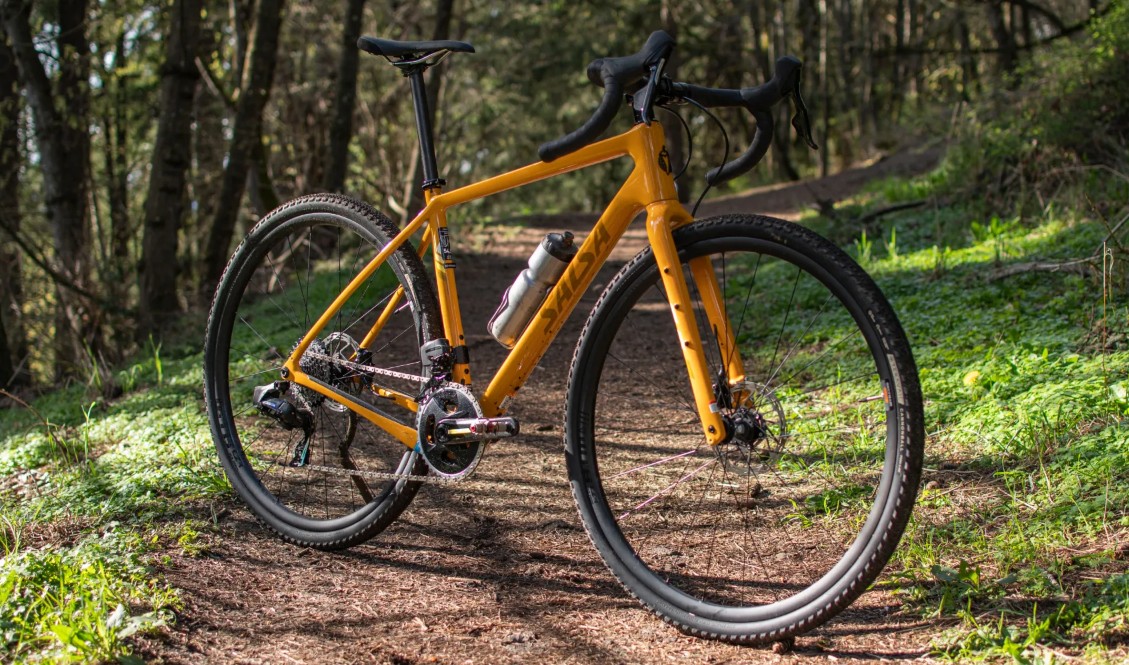
The Salsa Warbird C Sram Force AXS XPLR
Specifications
Reasons to buy
Reasons to avoid
Salsa is one the founding brands of the modern gravel bike, a story that starts with the launch of the Warbird in 2012, a bike inspired by the adoption of disc brakes in cyclocross a year or so before. The Warbird, now in its 4th generation, has always set the tone for where the next generation of gravel bikes might go.
However, last updated in 2019, the Warbird is starting to look a little long in the tooth. Nevertheless, in a world now seemingly obsessed with aerodynamic performance and complicated compliance aids, the Warbird retains a refreshing simplicity and lets its frame do the talking. As we found, the Warbird is no slouch, transitioning from the tarmac to gravel seamlessly, gliding over the rougher sections with ease, provided they don’t get too taxing.
The Warbird frame-only option represents exceptional value at $2199 allowing you to spend money on the components that better increase the bike's performance. When we reviewed the Warbird last year, we equipped it with Sram Apex AXS, an excellent budget wireless groupset, alongside Hunt 40 CGR Carbon wheels and an Ergon Allroad Carbon Post for extra speed and comfort.
Read more: Salsa Warbird C full review
Best budget gravel bike
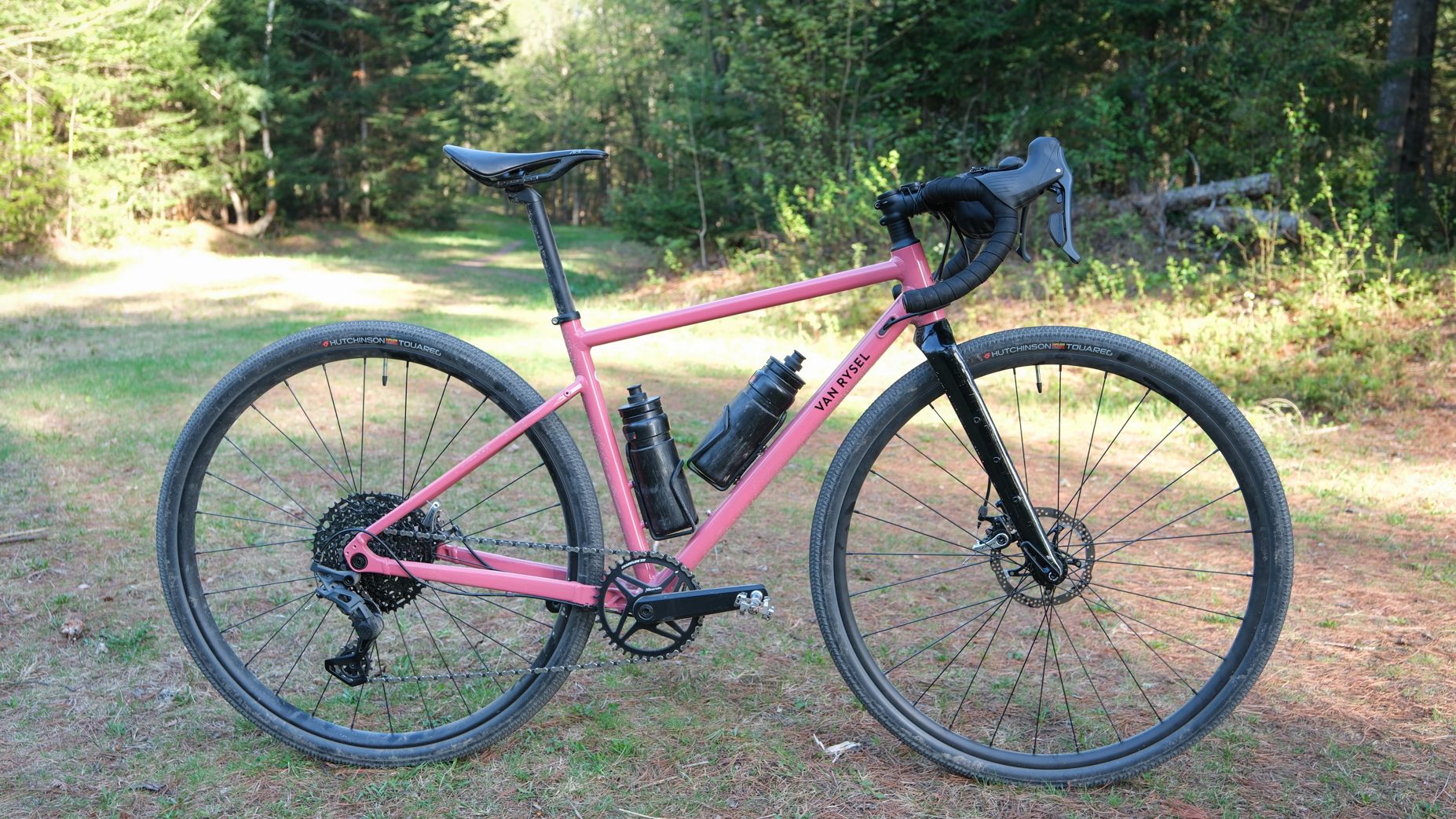
Specifications
Reasons to buy
Reasons to avoid
It's hard to discuss the Van Rysel GRVL AF 2 without having its price in the back of your mind. It's a bike that impressed me greatly, with balanced geometry, surprising comfort and clearly well-considered specification. Once you factor in that it is well under £1000/$1500, it stands out somewhat in what is becoming a very crowded gravel bike market.
Aside from the GRVL being new to me, so was the Microshift Sword drivetrain, which was launched a while back. However, given that we rarely get a chance to review an affordable bike, it was a chance to consider it. Again, I was pleasantly surprised; it features a very reliable shift, and the ergonomics are a massive step forward from the previous Advent shifters.
This all added to the GRVL's overall experience. Over the three days on Vermont’s lumpy backroads, it proved itself as a straightforward bike to get along with. It is stiff but not jarring, and the carbon fork and high-volume tyres help mitigate the impact of rough surfaces. The sweet spot geometry makes it a very usable bike in a wide range of scenarios, massively broadening its appeal as a bike not just for beginners.
Ultimately, the GRVL AF 2 is an excellent value gravel bike and one that is fantastic fun to ride. If I had to pick some holes, the alloy frame and wheels aren't the lightest and this adds to its overall weight. The latter is easy to replace, and Decathlon's smart use of aluminium, while a little heavier, does offer a comfortable ride, something rarely associated with the material.
Read our full Van Rysel GRVL AF 2 review
Best for bikepacking
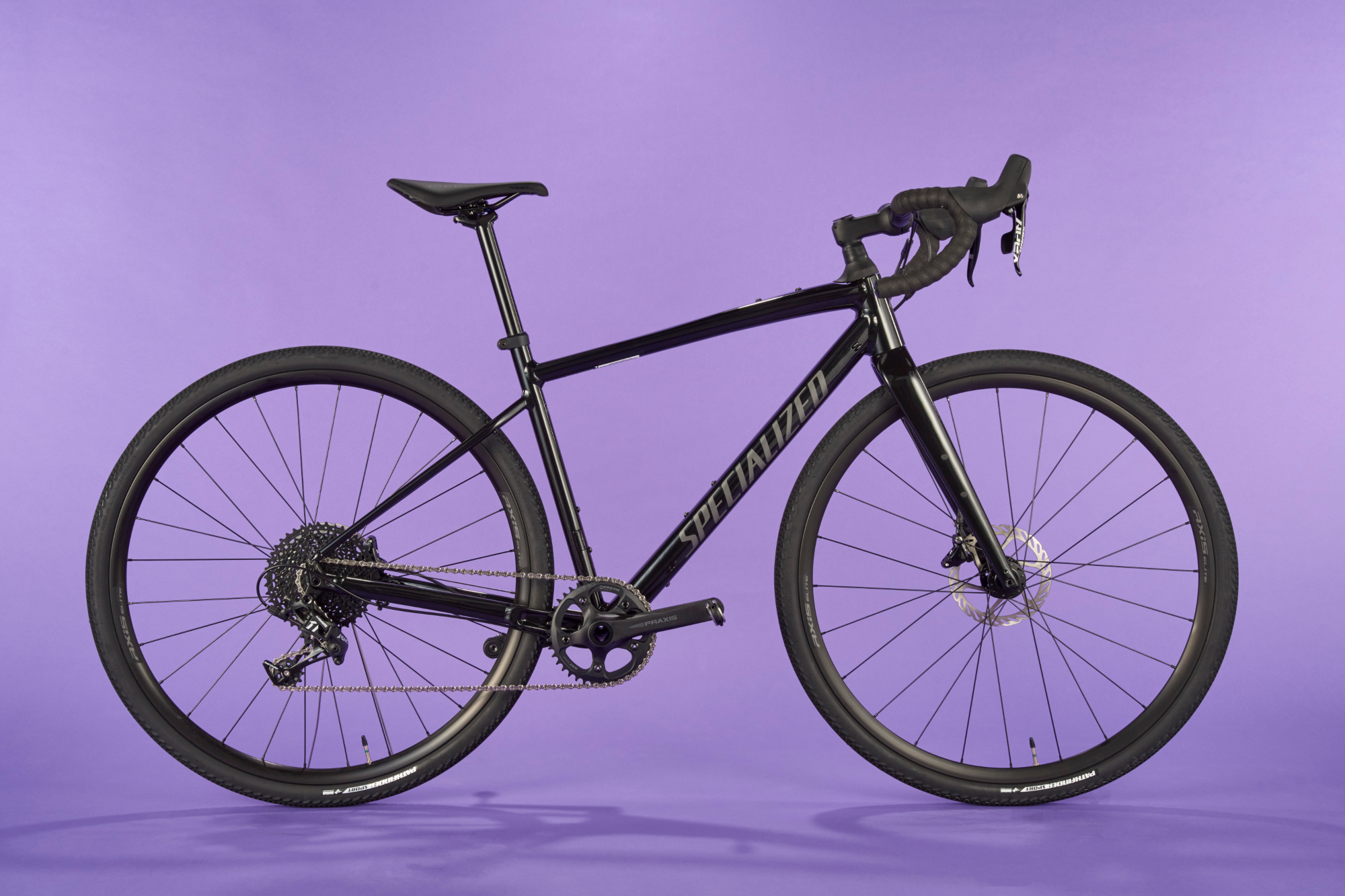
The Diverge is a do-it-all machine that can handle on and off road adventures
Specifications
Reasons to buy
Reasons to avoid
If your riding style is more adventurous, with the exploration of new trails, all-day epics, and occasional multi-day bikepacking trips, then the Specialised Diverge Comp E5 is well-suited to you.
Its relaxed geometry and high front end make for a more comfortable riding position. However, we found it a little more difficult to weigh the front tyre sufficiently when pinning the corners.
There's a full complement of mounts, with pairs under the down tube and on top of the top tube and triple bosses on the fork legs. If you prefer a more traditional luggage-carrying and splash-defending setup, you can also choose from full fenders and a pannier rack.
The Future Shock 1.5, trickle-down tech from the Carbon models, fitted to the Diverge Comp E5 elevates the Comp's performance above that of other aluminium bikes. The system does a great job of damping out some of the trail chatter and high-frequency bumps. The only downside I can see with it, is if you are looking to have a racey position, the system needs some stack to function, which makes dropping the front end difficult.
Specialised recently launched the new version for the Diverge range, which we will have a full review of very soon. In the meantime, why not have a read of Tyler's first ride review of the Diverge 4?
Read our full Specialized Diverge Comp E5 review
Best of British
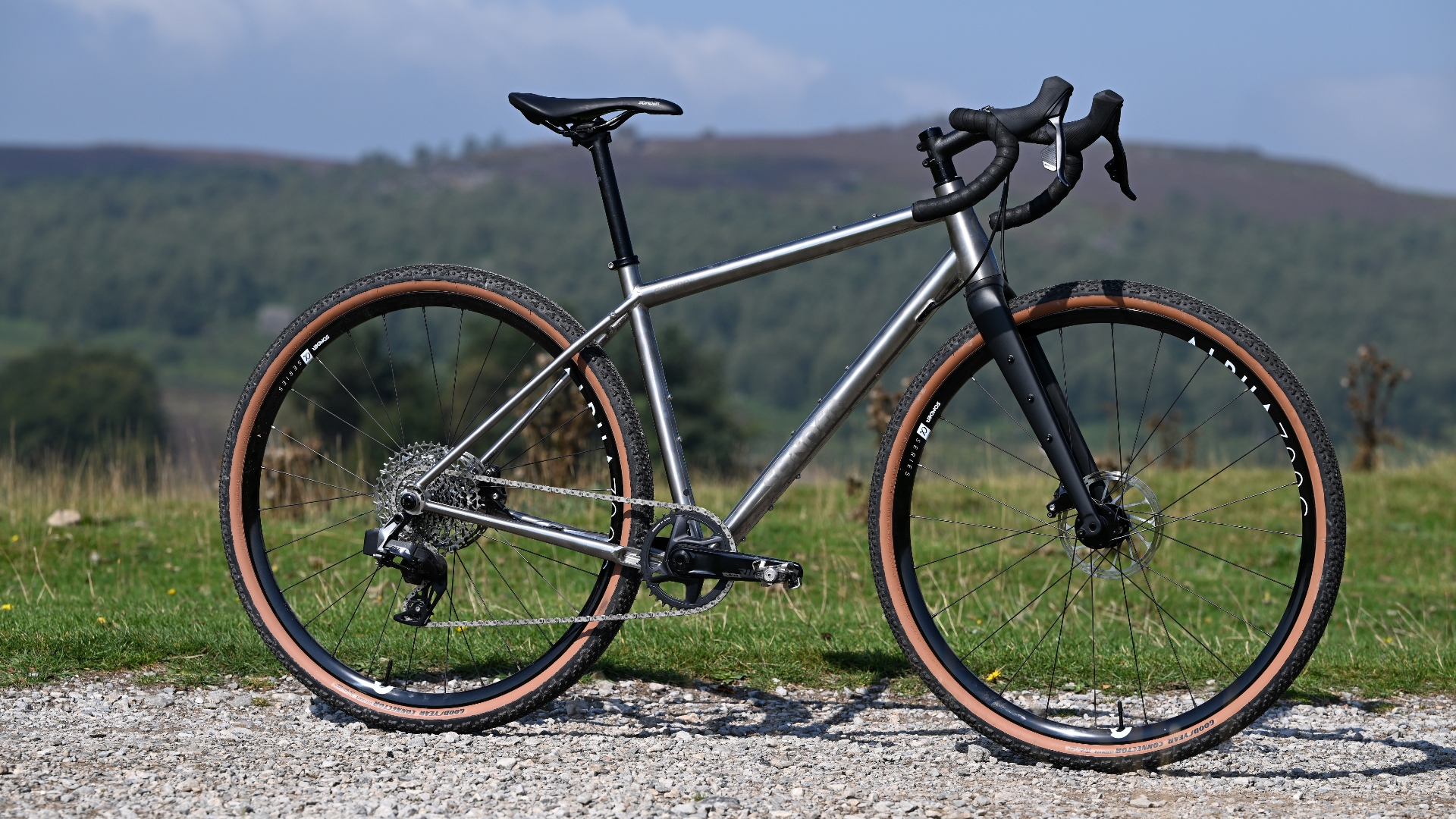
Who doesn't love a shiny titanium bike
Specifications
Reasons to buy
Reasons to avoid
The Camino Ti is unashamedly a bike designed for technical gravel as much as long-distance adventures; there’s just something about its straight tubes and raw finish that’s hard to beat. This is reflected in the slacker geometry and longer wheelbase than most of the other bikes we have tested. This also allows room for up to 50mm tyres or 2.2” in 650b. Our Ti Rival1 AXS XPLR featured a Rival AXS groupset, a carbon fork, and Sonder’s handbuilt Alpha alloy wheels and finishing kit.
During my time on the Camino, it proved very capable and versatile. For my first ride, I strapped on some bike luggage to venture off for my son’s first bike-packing trip. The load was heavy and the pace slow, but the Camino made it a pleasure, remaining agile and responsive. For the majority of the rest of the testing, I dropped the bags, tweaked the tyre pressures and headed out onto the technical trails I’d usually ride on my mountain bike. With your weight in the middle of the bike, it’s incredibly stable and easy to manoeuvre on twisty and rocky trails. On the road, the Camino will never be as quick as a more racing-biased gravel bike, but it does a perfectly good job. It’s responsive to pedalling efforts whether you’re spinning along or out of the saddle.
The Camino is competitively priced for a titanium-framed bike with a full Rival AXS drivetrain. If you consider the enjoyment factor and the range of gravel riding you get to do, then its value exponentially increases.
Read our full Sonder Camino Ti review
Best for gravel racing
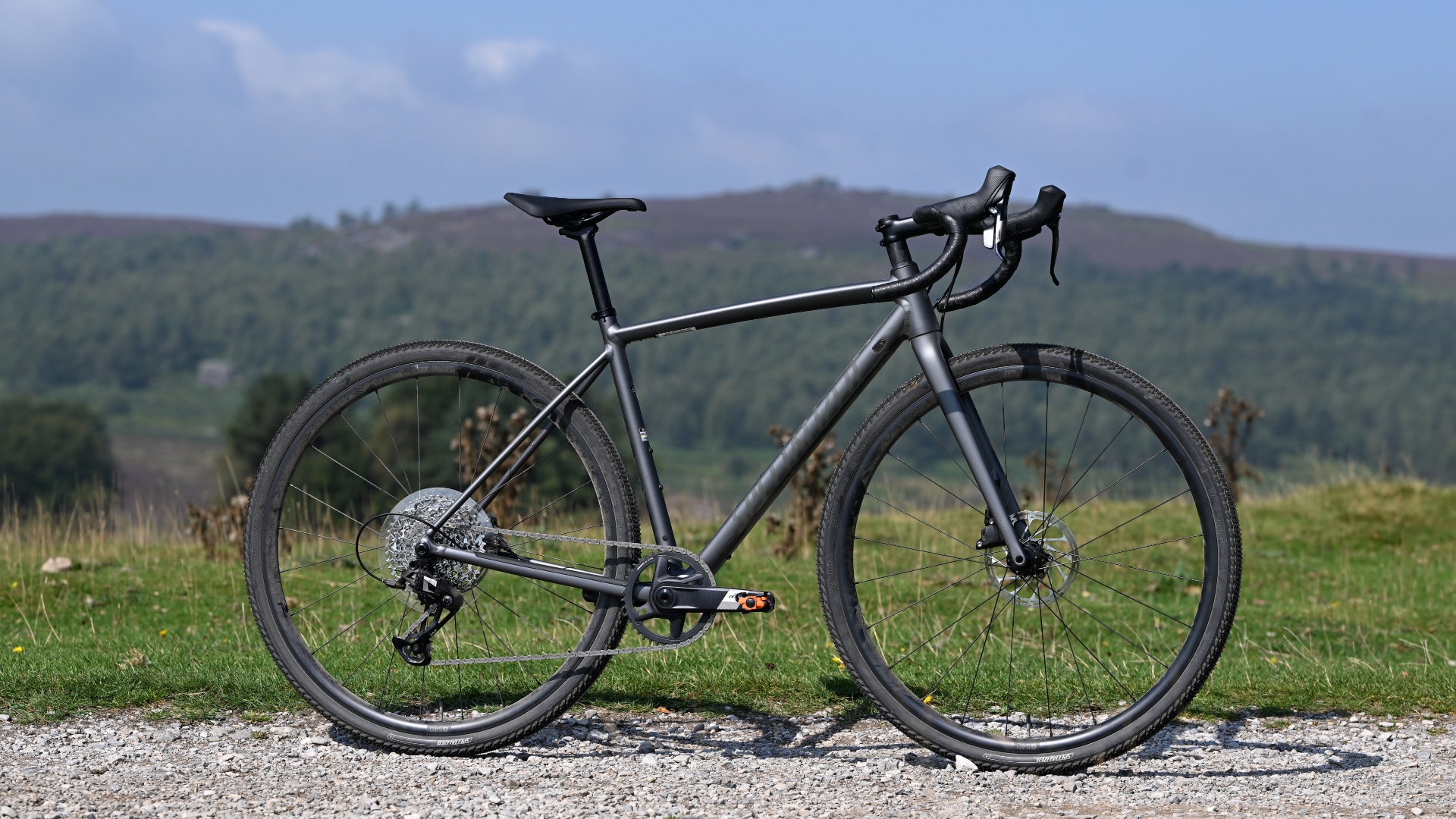
Specifications
Reasons to buy
Reasons to avoid
The Crux DSW stays true to the design and purpose of its far more expensive carbon sibling, but thanks to intensive R&D, Specialized has produced what it claims is the “lightest alloy frame in the world” (claimed weight 1,399g). It also claims to be more durable and have an “improved ride quality.” It is equipped with race-orientated geometry and a short wheelbase, but there is still scope to run big tyres up to 47mm.
A striking feature of the Crux DSW is its simplicity—straight tubes, simple semi-internal cabling, and a standard bar and stem—nothing to charge, nothing to spend hours fiddling with to set up, and no proprietary parts that require specialist tools.
The Crux’s sprightliness makes it a joy to ride. I found myself sprinting into every turn and transition and trying to put down more and more power on the straights. It’s fast and nimble on technical trails and descents, too. On the downside, I found it much harder to pace longer rides on the Crux as it encourages you to ride hard. The race-tuned stiffness of the frame and fork will also add some fatigue to longer stints in the saddle. Whilst designed as a race machine, there’s plenty of scope within the geometry and components to enable you to tweak it for a more upright position for longer rides.
Read our full Specialized Crux DSW Comp review
Best frame only option
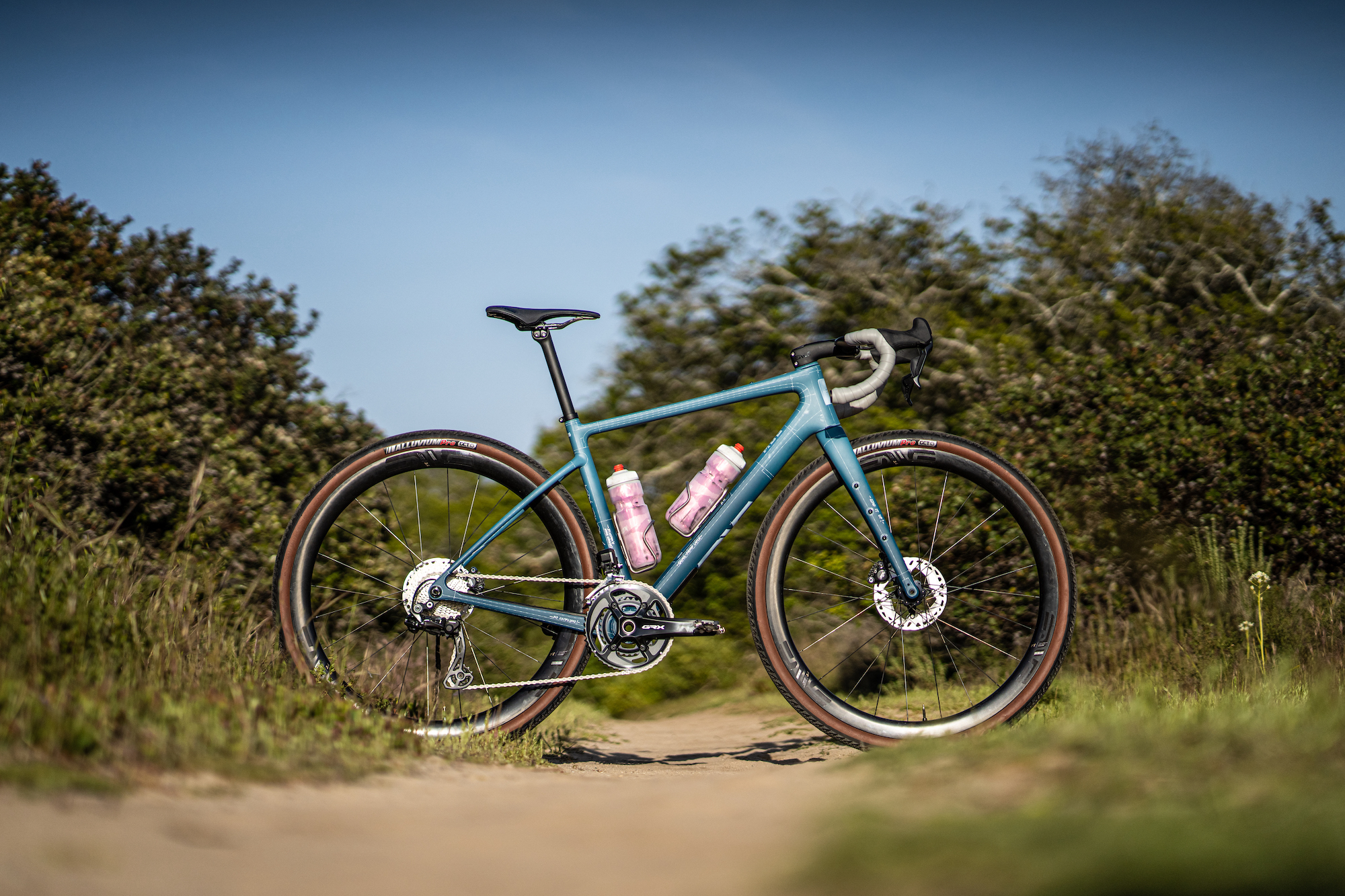
Alexey Vermeulen's custom Enve MOG
Specifications
Reasons to buy
Reasons to avoid
Enve has developed a reputation for incredible quality and high-performance components, with many of them made in the USA. The MOG is the second bike to come out of Enve in as many years, the first being the gorgeous Melee road bike that launched to great acclaim back in 2022.
The MOG has all the tick-list features of modern gravel bikes such as big tyre clearance, frame storage and mounts galore. At £5500/$5500 it seems odd to suggest the MOG offers good value, but for a brand with such a reputation for design, engineering and quality, it does. The kit includes a frame, fork, headset, stem, handlebar, and seatpost, which is in line with brands like Trek and Specialized who can call on much larger economies of scale.
The MOG’s headline act is when it hits the dirt. I found it offered a great balance between stiffness and comfort. It's not outsprinting anyone but it's keeping up, and at the same time not beating you up. The slack geometry inspired us to push on the descents with a surprising amount of confidence, a trait that would most definitely appeal to those looking to load up and go bikepacking.
Read More: Enve MOG first ride review
Best lightweight gravel bike
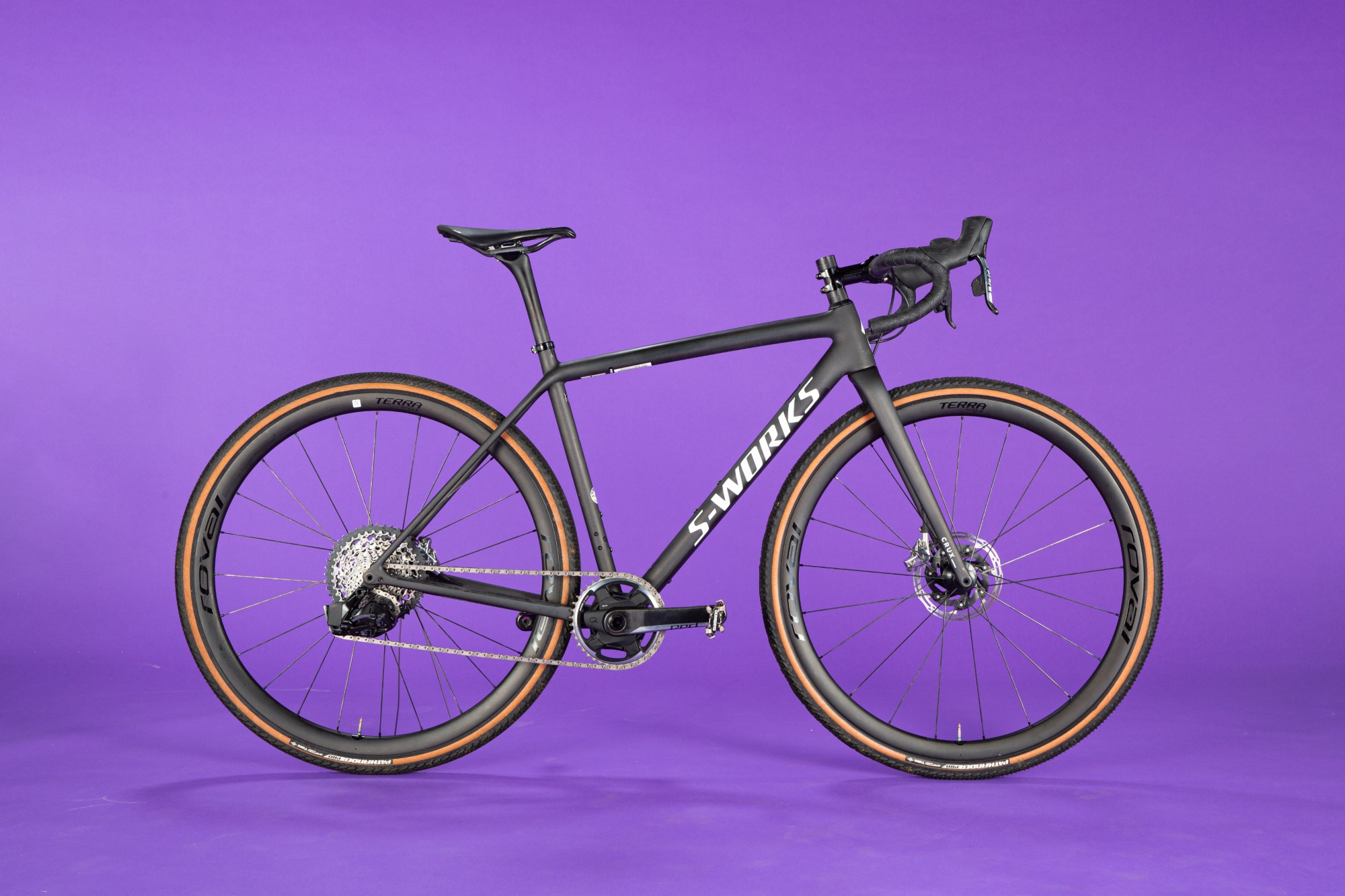
The Crux is lightweight, stripped back and ready to race
Specifications
Reasons to buy
Reasons to avoid
The S-Works Crux is undoubtedly expensive; few can afford a 12k bike, but wow, what a bike! The Cruz is a utopian bike. Of course, it's not as comfortable as the Diverge, but its agility, stability, and lightness are out of this world. During my time on the Crux, I stole KOMs, got PBs, and generally rode far beyond my normal zones and heart rate.
The Crux's versatility is attractive, too. It can accommodate 2.1" 650b and 47mm on 700c rubber, which should add a touch more comfort and extra traction. With its low weight and aggressive riding position, you can take it Cyclocross racing in the winter if you're inclined.
I reckon that the Crux fits the bill for riders who want agile performance on gravel but with the ability to put down the power for outright speed. There is no doubt when things get chunky, like the Peak District riding I have locally you will find its limit fairly quickly. However, for anyone with more open riding, like in the US or more southern parts of the UK, you can't go wrong with any model in the Crux range.
Read our full Specialized S-Work Crux Pro review
Best steel gravel bike
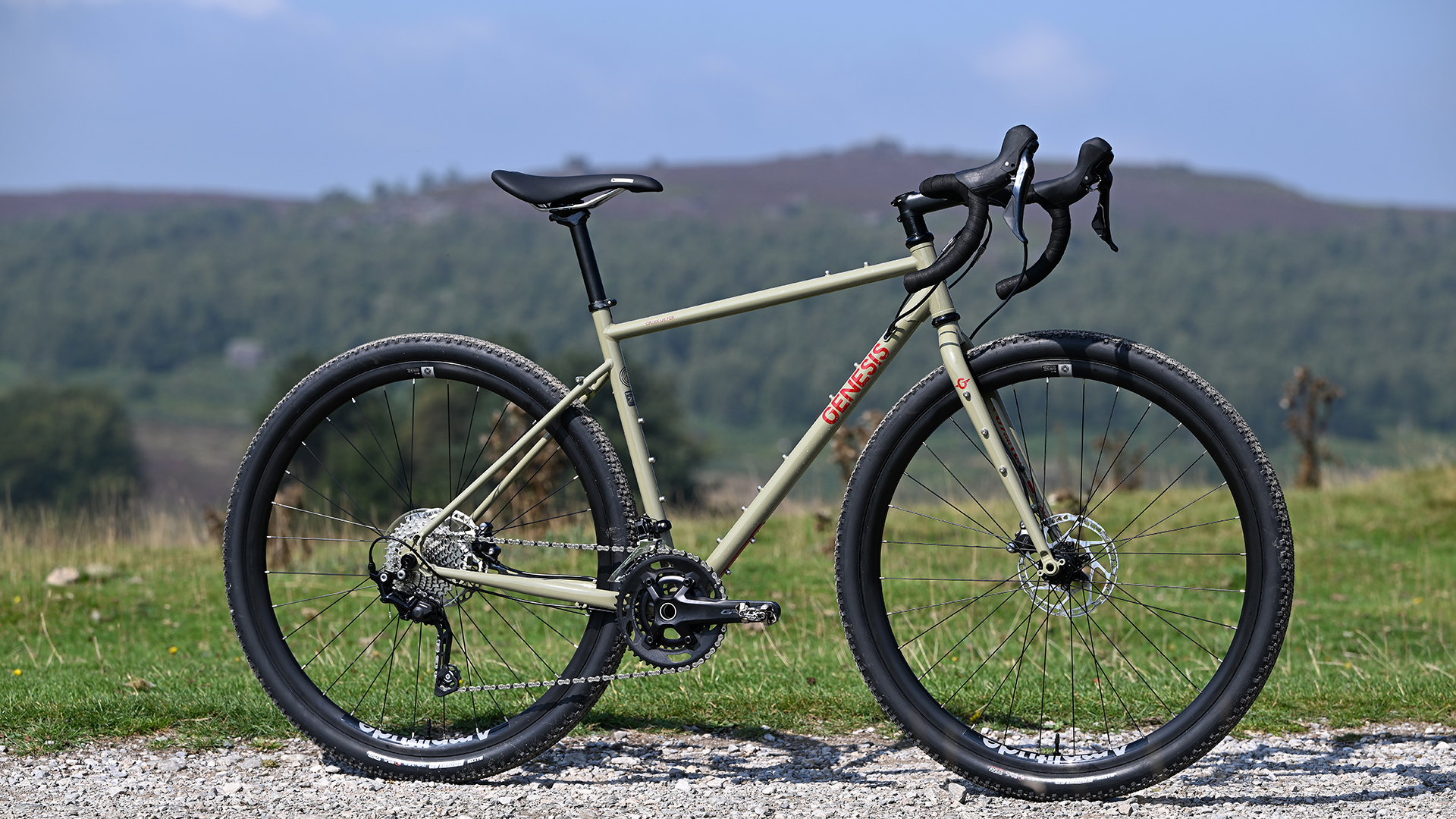
Specifications
Reasons to buy
Reasons to avoid
The ethos of the now iconic Croix de Fer hasn’t really changed since it was first released in 2009. A steel frame, generous tyre clearance, and an array of mounts for bags, bottles, and racks are key to this bike's versatility and character. But the latest version has taken a step forward. The CdF 30 is a beautiful bike to look at. The simplicity of the Reynolds 725L tubing, alongside the classic colourway and graphics, really catches the eye.
The CdF is instantly comfortable thanks to the combination of its upright position and compliant frame. It just does everything you want it to do without the vagaries and fickleness of a bike that’s designed too much for one thing or another.
Naturally, for a bike that weighs over 11kg, there’s not an instant or huge reward if you try to push the pace. Think diesel engine rather than a V8 petrol. However, handling is sure and steady, and while twists and turns in the trail are rewarding, they don’t come with a huge burst of adrenaline.
But where the CdF really excels is on those long, all-day rides, which are measured in pace rather than speed. This is a bike that I’ve enjoyed taking the de-stressing scenic route trails home and then being able to load up at the weekend with a family’s worth of picnic and detritus for a long day out. It’s pleasurable and reliable, doing everything I want it to do - a bike for life and all of its adventures.
Read our full Genesis Croix De Fer 30 review
How we test
We have a dedicated team of testers here at Cycling Weekly, whose job is to review a whole range of cycling products and to write objective reviews of their experience of using them day in and day out in a whole range of conditions.
With huge experience, they're well-placed to compare products, identify their strengths and weaknesses and bring you an honest, unbiased assessment of how they perform.
Testing gravel bikes calls for the logging of plenty of miles - and our testers do just that. Depending on the bike, routes range from technical mountain bike-style trails to multi-day bikepacking adventures and plenty in between. We also make sure that we test the bikes on paved roads, given that many riders will use gravel bikes for commuting and winter riding, and many gravel rides will involve some tarmac as well.
While out riding, we asses the bikes across a range of factors, including comfort and handling, suitability for a variety of gravel terrain and bikepacking, as well as the quality and durability of components and the bike's overall value for money.
Read more on How we test products on our dedicated page.
How to choose the best gravel bike for you?
Firstly, what is a gravel bike?
Gravel bikes aren't defined by just the shape of their handlebar. Although they typically come with a drop bars, some brands have started introducing flat bar versions. In a sentence, they are bikes that allow you to veer off paved roads and onto more exciting terrain whenever you feel like it.
Born with the spirit of adventure, the best gravel bikes sit somewhere between the best endurance and sportive bikes and the best cyclocross bikes, with a blend of the best hardtail mountain bikes thrown in. They're nimble on paved sections of road compared to fat-tired MTB steeds, but more confidence-inspiring when it comes to tackling rough surfaces when compared to their slick-tired road-going siblings.
The best gravel bikes typically feature wider tyres, with room for extra mud clearance, and disc brakes as standard. Expect anything from 35c up to 50c or more on either 700c or 650b wheels.
Mounts for bottle cages, pannier racks and extra storage will often feature on the best gravel bikes, as will the option for fitting fender/mudguards.
As with all bikes, it's vital that you get the best bike to fit you, and it doesn't need to be gender specified. But if you are after a women's specific model, which often includes smaller sizes and different touchpoints like a wider saddle and narrower bars, you might want to check out our best women's gravel bikes for off-road adventures page.
If you're juggling a tighter budget, but still want the best, our page dedicated to the best budget gravel bikes: gravel bikes under £1,000/$1500 are ideal for getting the best value for money adventures on two wheels. These bikes typically come with similar handling characteristics to the more expensive bikes but feature more economical componentry.
This crossover discipline can add a slight confusion in the cycling gear department too, i.e. to Lycra or not to Lycra. Thankfully our guide on the best gravel bike clothing: cycling kit for your gravel ride should sort out any kit quandries.
Are gravel bikes any good on the road?
Compared to road bikes, you will find wider and lower gear ratios on the best gravel bikes, which will help you ride over loose or hilly terrain especially when carrying bikepacking bags if you're gearing up for multi-day expeditions.
In general, the best gravel bikes will also have a lower bottom bracket than a cyclocross bike, helping to provide enhanced stability on rocky, rooty and rough terrain. For more details on exactly what the differences are, you might find our gravel vs cyclocross bikes: what is the difference page really helpful.
For those wanting to head off the beaten track, but worried about keeping up, you might want to consider an electric version. Electric gravel bikes give you all-terrain capability and confidence-inspiring stability but with some additional assistance.
Why are gravel and adventure bikes so popular?
If you’ve ever gone out on a ride on your best road bike and noticed unpaved roads, fire trails or alluring singletrack as you passed, wondering where they lead but hesitating to head off the tarmac, then a gravel bike or adventure road bike may be for you.
These bikes aim to meld on-road efficiency with off-road capability, so you'll find overlaps in design features with both road and cyclocross bikes, as well as incorporating elements from mountain bike technology. When you're shopping for your first gravel bike, as standard you should expect disc brakes and clearance for wider tyres.
Whereas cyclocross bikes are designed with short, muddy races in mind, gravel and adventure bikes take longer unpaved rides into account. You'll still find race-orientated builds in the gravel category for gravel racing, alongside adventure bikes that feature additional clearance and mounts to accommodate luggage and often even wider tyres for more remote journeys.
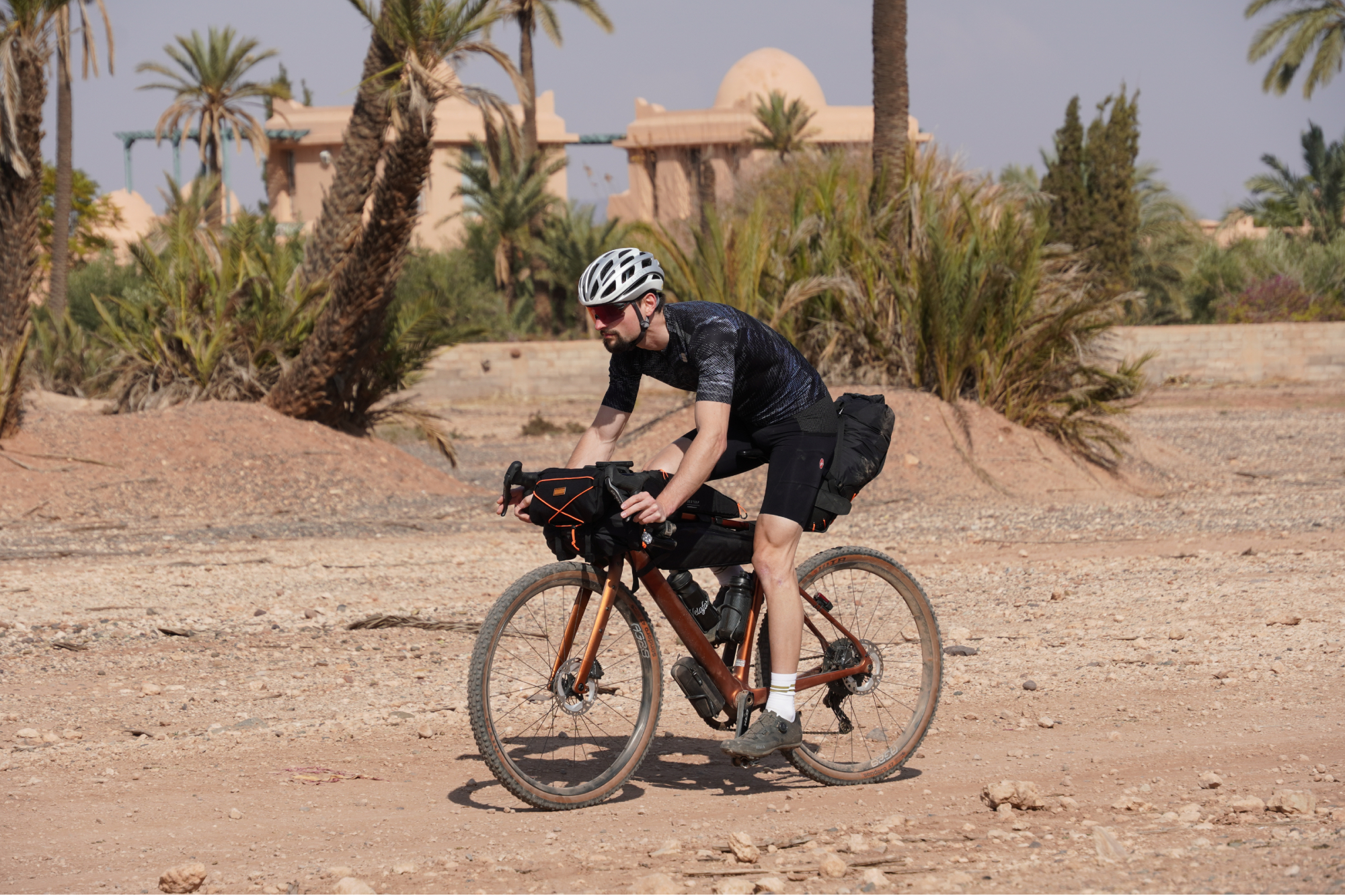
Does the frame and fork material matter on a gravel bike?
As with road bikes, gravel bikes can be made from carbon, aluminum, titanium or steel.
Carbon and aluminum are the two most commonly used frame materials, and all the bikes in this guide are made from one or other of these two options. Carbon tends to be more expensive and lighter whilst aluminum frames are heavier but cheaper. This means that for a similar price, you can expect better components on an aluminum-framed bike than on one with a carbon frame so you might have to decide where your priorities lie when choosing between the two.
The big advantage of using carbon as a frame material is that it can be added exactly where it is needed for strength and stiffness or removed where it is not needed to lower weight and fine-tune compliance.
Titanium gravel bikes are less widely available, with aficionados often describing the ride quality as being more ‘lively’ than carbon or aluminum whilst also offering low weight and high strength among its qualities.
High-end steel frames offer an almost titanium-like ride, albeit with a bit of a weight penalty whilst at the lower end some manufacturers offer steel bikes as a potentially more durable and repairable option to aluminum.
Regardless of frame material, most gravel bikes have carbon forks as the carbon layup can be tuned to provide some degree of protection against trail vibrations which is important at the front end of an off-road bike.
How does gravel bike geometry differ from road bikes?
Stability and handling are key when it comes to riding off-road. Expect to see a lengthened wheelbase, slack headtube angle and lower bottom bracket compared to road bikes, all of which aid with technical terrain and steeper descents.
The rider position is typically more upright than on road bikes, both for comfort over long rides and to allow the rider to move their weight around more easily when negotiating off-road obstacles.
Do gravel bikes have other specialised features?
Thru-axles and disc brakes have quickly become standard on gravel (and many road) bikes, technologies borrowed from mountain biking. You can also find front and rear suspension, although these aren't commonplace yet.
The norm is 12mm thru-axles, which make for easier disc brake alignment and rigidity. Rear-axle spacing for disc brake wheels is typically 142mm (thru-axle), or occasionally 148mm Boost spacing for stronger wheelsets.
More adventure or utility-centric frames will come with mounts for racks and fenders so that the bike can be used as a sturdy commuter or year-round road bike. At the most extreme end of the adventure bike market, fork leg mounts and extra frame mounts are becoming increasingly common for even more luggage carrying options.
Gravel components: All you need to know
There is a wide range of specialist gravel bike components which add extra features for gravel rides that are different from those you'd find on road bikes. Below are a few things to consider when looking for the best gravel bike for your needs.
What are the best tyres for gravel and adventure bikes?
You can find adventure road and gravel bikes shod with tyres of pretty much any width between a 28c and 47c, plus tyres measured in inches on 650b wheel builds!
The best gravel bike tyres can dramatically improve your ride. There's a real range of tread patterns available, which can add extra grip for muddy conditions or lower rolling resistance if you're mixing in more tarmac and cater for everything in between.
We think changing your tyres is one of the best gravel bike upgrades you can make. Going tubeless is also a great option to improve comfort and reliability.
In the UK, you're likely to come across patches of wet mud or loose dirt year-round, so a more aggressive tread can be useful in those situations to help you maintain grip, albeit at the expense of on-road speed.
But in the US, gravel roads can range from well-graded packed dirt that almost resembles tarmac, to the crushed and graded limestone you find in the Flint Hills of Kansas.
Finding the right tyres for your riding terrain may take some experimentation, and don't be afraid to try something with more or less tread than you're used to. You might also want to change your tyres between summer and winter to get the best width and tread pattern for the conditions.
Most gravel and adventure bikes are specced with tubeless or tubeless-ready tyres and rims, ready for conversion to a tubeless set-up. Rather than having to replace an inner tube every time you flat, the sealant in the system will (in theory) plug any punctures from sharp objects like thorns, which is a real advantage when it comes to riding off-road.
You may need to re-inflate the tyre a little if you have a puncture. Tubeless tyre plugs can get you riding quickly, but make sure you're equipped with a spare tube and full tubeless repair kit for more serious tyre damage.
What are the best gearing options for gravel and adventure bikes?
Adventure road bikes and gravel bikes are designed to be ridden on the road as well as off, so you'll typically find a wide gear range to allow both efficiency and speed on the road, as well as enough gears to cope with loose and steep terrain off-road.
The choice between a double or single chainring up front is usually down to rider preference. A 1x (one-by) set-up gives ultimate simplicity and can allow for greater tire clearance, but sometimes at the cost of wider jumps between ratios, although the latest 12 and 13-speed groupsets go some way to avoiding this.
Double chainrings offer more options for riders who prefer to spend more time on smoother terrain or on the road and may give you a greater overall range with smaller jumps between ratios.
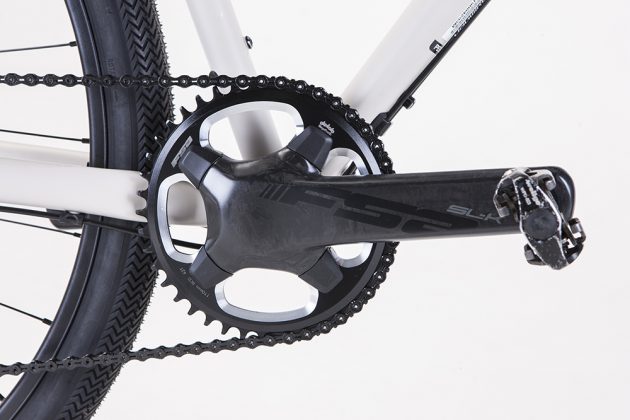
A 1X drivetrain keeps it simple and can allow for greater rear tire clearance
Gravel bikes often feature a drivetrain that goes below 1:1 for off-road climbing and load carrying. That might be via a 1x set-up like SRAM XPLR with a cassette that goes to 42 teeth or greater or a two-ring supercompact chainset with 48/32 or 46/30 chainrings paired with an 11-32 or 11-34 cassette. You'll even find "mullet builds" that mix a road chainset with an MTB cassette and rear derailleur for ultra-low gearing, as low as 38x52t.
Read our guide to gravel bike gearing for more.
What pedals are best suited to gravel and adventure bikes?
Pedal choice is a matter of personal taste and will be dependent on your riding style, but check out our guide to the best gravel bike pedals for advice. If you ride predominantly on roads and well-maintained paths where you rarely need to put a foot down, then road cycling shoes, clipless pedals and cleats may be a good choice.
On the other hand, more demanding off-road riding may mean that you need to dismount and walk with the bike or put a foot down for stability. In this case, gravel bike shoes and two-sided gravel bike pedals with grippy treaded soles and recessed cleats derived from mountain bike systems may be a better choice for their ease of walking and easier foot engagement with the pedal.
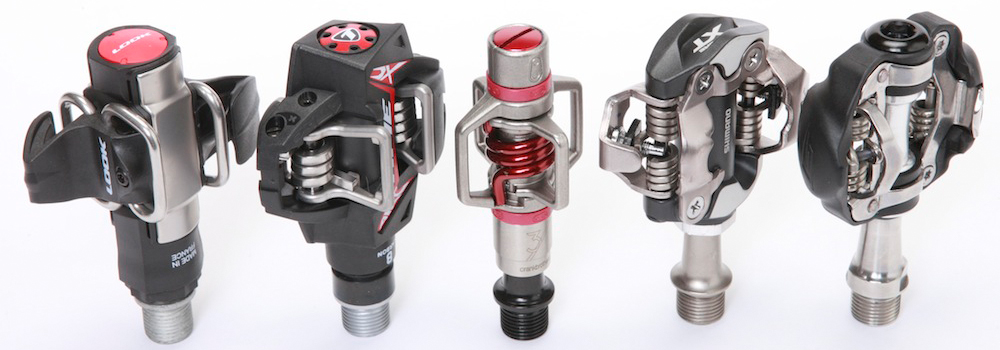
Mountain bike style pedals make walking, mounting and dismounting easier
What components should I expect to find on the best gravel bikes?
Adventure and gravel bikes use disc brakes for their better modulation and more consistent stopping in dry, wet and muddy conditions. This also has a really positive impact on wheel rim longevity compared to rim brakes for off-road riding.
On higher-value models, the brakes will be hydraulic, while budget bikes typically have mechanical callipers. With Shimano's GRX and SRAM's gravel-specific groupsets available with hydraulic discs only, this tends to be the preference. You'll occasionally find mechanical disc brakes on adventure bike builds, where long-distance riders find them easier to maintain and repair in more remote situations.
Different types of handlebars are also worth considering on adventure bikes. Again, we've got a guide to the best gravel bike handlebars for more info.
Flared bars are generally accepted as a good upgrade to give greater stability in the wider drops for rough terrain and descending off-road. The wider the flare, the easier it is to fit a handlebar bag on the front of the bike and still be able to fit your hands on the drops and brakes at the same time. Raised bars such as the Specialized Hover Bar also help to give more clearance over the front wheel for smaller riders, as well as providing a more upright riding position.
Short travel suspension forks like the RockShox Rudy Ultimate XPLR and the Cannondale Lefty Oliver are also an option that is sneaking into gravel bike design.
Frequently asked questions about gravel bikes
What's the lifespan of a gravel bike?
The lifespan of a gravel bike in theory is similar to that of any other bike. How and where you ride your gravel bike can influence this, but we are mostly talking about the components and paintwork rather than the longevity of the frame and fork. Ultimately, it all depends on how well you maintain your bike.
It is not unreasonable to expect well over 10 years out of a bike, well, at least the frame, fork and wheels. However, it is inevitable that components will wear depending on your mileage. Expect to have to replace the chain and cassette, for example, multiple times throughout a bike's life, perhaps even multiple times per year.
What is the best gravel bike for a beginner?
There has been a fairly standardised 'entry' into the gravel market for some time, with much dictated by the cost of groupsets. The likes of Microshift Sword, Shimano's new Cues drop bar systems, but previously their Sora, Claris and entry-level GRX, along with SRAM's slightly more expensive Apex groupsets.
Cost aside, it depends on your background in cycling as to what you may consider a 'Beginner gravel cyclist' to be. For many, it will be a cost-based decision, in which case you can't go wrong with our best budget gravel bike, the Van Rysel GRVL AF 2. Which offers balanced and fun handling, robust build and all at a very reasonable price.
For those who are already cyclists and are transitioning to a new discipline, you may have slightly higher expectations or requirements for the specification and geometry. While the Van Rysel could still offer something here, the versatility of models like the Specialized Diverge and Giant Revolt, could be a good place to start and work outwards from.
Can gravel bikes really do it all?
Very bluntly, no! By no means are they rubbish, and many of the more up-to-date models that feature 50mm plus tyre clearance are certainly getting close to the do-it-all category.
The easiest way I find to describe gravel bikes is a jack of all trades and a master of none. You have to remember that this is based on a large segment of the gravel market, which is focused on that wide-ranging versatility we all want from them. Within that, there are again niches which feature much more dedicated use cases and practicalities designed for a specific style.
Essentially, gravel bikes are very versatile but tend to struggle on the fringes of their use case. As a straightforward example, a gravel bike designed primarily for off-road use, such as the Cotic Cascade, will struggle on the road, but it doesn't mean it can't do so with the right tyres or with the right legs.
The latest race content, interviews, features, reviews and expert buying guides, direct to your inbox!
Like many, Matt began his bicycle industry journey on the spanners at his local bike shop. After spending his youth mountain biking, he was inspired to embrace gravel during his tenure with Evans Cycles' in-house brands, Pinnacle and Hoy Bikes. Recognising the evolving industry, Matt eagerly seized the chance to become an E-bike designer, winning several awards with the E-bike brand Cairn Cycles.
These days, Matt is likely to have a toddler sitting shotgun or off the beaten track somewhere on the South Downs.